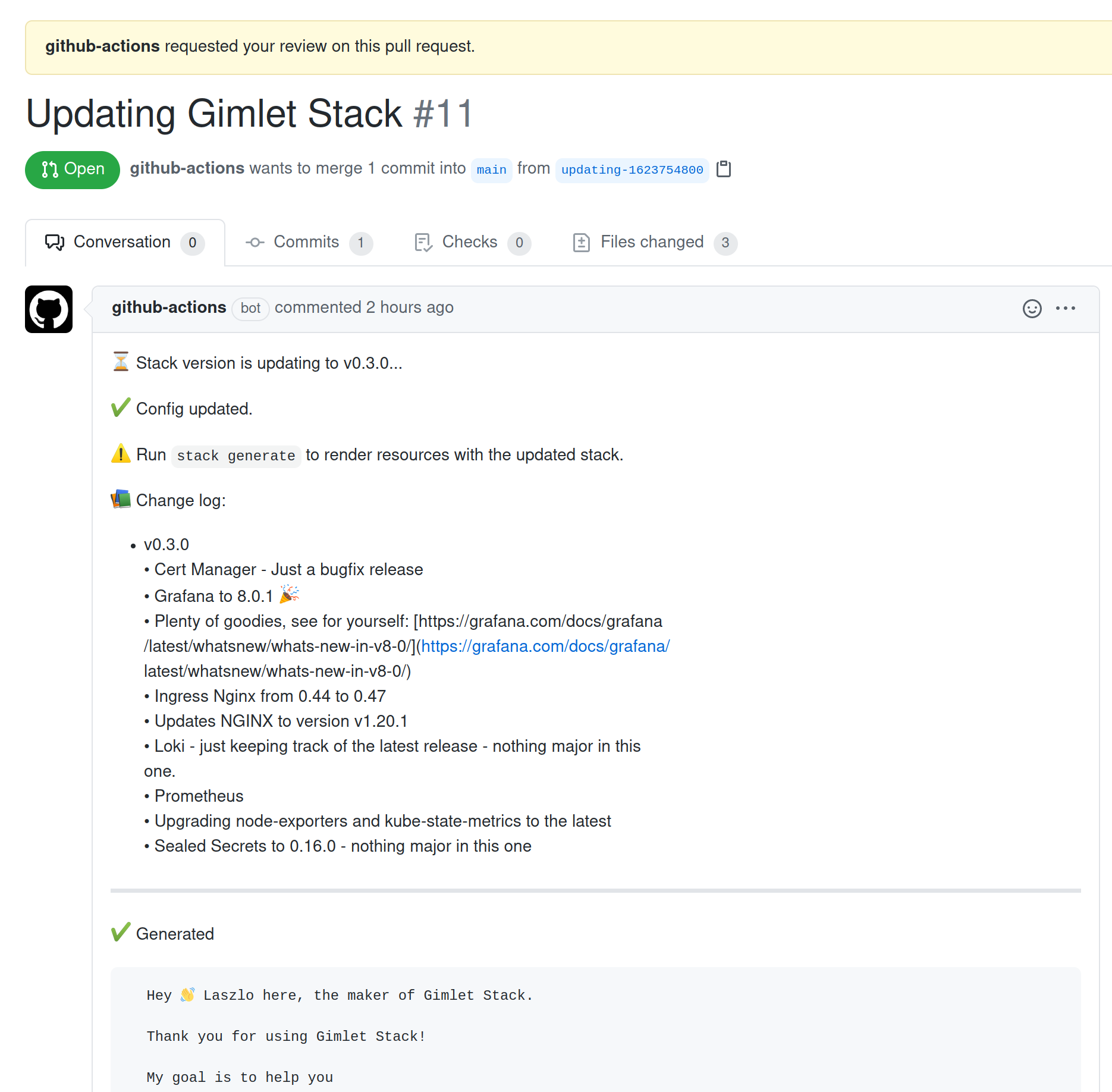Updating stacks 
When you run stack configure and configure components on the UI, the configuration options are stored in a file
called stack.yaml.
The next time you run stack configure, the configuration options are read from stack.yaml, you can reconfigure your settings this way.
As you can see, the stack.yaml file contains the full configuration of your stack, and you should version it in your stack repository.
Always re-generate after you reconfigured
stack.yaml is Gimlet Stack's own format, therefore, for your configuration changes to take effect on the cluster, make sure to run stack generate every time you make changes to the stack.yaml file. Be those changes through the UI or manual.
Once you run stack generate, made a git commit, and pushed, you should see the changes on your cluster.
Stack version is locked
stack.yaml has a reference to the stack template. Under the stack.repository field, it points to a git repository where the stack files are maintained.
---
stack:
repository: https://github.com/gimlet-io/gimlet-stack-reference.git?tag=v0.8.0
config:
loki:
enabled: true
nginx:
enabled: true
host: laszlo.cloud
By default, it is locked to a particular version, therefore, every time you run stack generate, it works with the same stack version and generates Kubernetes resources accordingly.
Updating
stack update --check displays the new versions that can be applied to your stack, while running stack update will update stack.yaml to the latest stack version number:
$ stack update
⏳ Stack version is updating to v0.3.0...
✔️ Config updated.
⚠️ Run `stack generate` to render resources with the updated stack.
📚 Change log:
- v0.3.0
• Cert Manager - Just a bugfix release
• Grafana to 8.0.1 🎉
• Plenty of goodies, see for yourself: [https://grafana.com/docs/grafana
/latest/whatsnew/whats-new-in-v8-0/](https://grafana.com/docs/grafana/
latest/whatsnew/whats-new-in-v8-0/)
• Ingress Nginx from 0.44 to 0.47
• Updates NGINX to version v1.20.1
• Loki - just keeping track of the latest release - nothing major in this
one.
• Prometheus
• Upgrading node-exporters and kube-state-metrics to the latest
• Sealed Secrets to 0.16.0 - nothing major in this one
It’s important to note that you have to run stack generate to generate the updated Kubernetes manifests, as stack update only updates the stack reference in stack.yaml.
Make sure to
- inspect the change set
- resolve possible conflicts with custom changes
- push to git
Automatic updates
You can automate stack upgrades by using the automation process provided by Gimlet Stack.
The implemented Github Action
- periodically checks for updates,
- runs
stack updateon new versions - and opens a Pull Request with the new version
- it can also assign you as reviewer

See the action in an example workflow.
Making custom changes to a stack
Stack templates only go so far, and it is inevitable that you want to amend the generated manifests in certain ways.
stack generate takes your custom changes into account and keeps them even after a configuration change or an upgrade.
If your custom change has conflicts with the generated content, you have to do a content merge, that should be familiar from git.
Custom changes with conflicts
The below output was from a stack that was upgraded from 0.2.0 to 0.3.0 while having a custom change on top of 0.2.0.
The stack
operator manually upgraded the version to 3.27.0.
Since stack version 0.3.0 also updates the ingress-nginx version, the operator has to make a judgment call whether to keep the manually updated version or roll with generated changes.
---
apiVersion: helm.toolkit.fluxcd.io/v2beta1
kind: HelmRelease
metadata:
name: ingress-nginx
namespace: infrastructure
spec:
interval: 60m
releaseName: ingress-nginx
chart:
spec:
chart: ingress-nginx
<<<<<<<<< Your custom settings
version: 3.27.0
=========
version: 3.33.0
>>>>>>>>> From stack generate
sourceRef:
kind: HelmRepository
name: ingress-nginx
interval: 10m
Many editors have conflict resolution tooling. With a click of a button, the operator can accept the changes coming From stack generate.